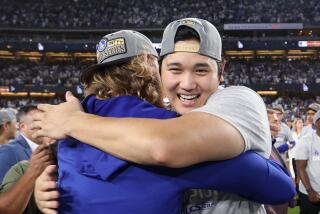THE LAND OF OPPORTUNITY : Soviet Wrestler Is Red Menace : Oganisian Enrolls at Nebraska After Odyssey From Moscow
- Share via
LINCOLN, Neb. — Call this one “Ovanes Oganisian’s Excellent Adventure.”
It begins in Moscow, makes stops in Shannon, Ireland; Havana, Mexico City, the Tijuana bus station, the Los Angeles Greyhound station, the Los Angeles Hilton, Montebello and finishes up in Lincoln.
Oganisian, 20, is a wrestler from the Soviet Union. He says he came to the United States last spring “just to see America,” then decided to stay.
He recently began attending classes at the University of Nebraska, majoring in pre-pharmacy.
Oganisian, a 190-pounder, placed sixth in the Soviet championships in 1989. His brother was an Olympic champion in 1980.
“I still can’t believe it,” Tim Neumann, Nebraska’s wrestling coach, said of a potential world-class wrestler virtually falling out of the sky and into Neumann’s already strong program.
“When he told us on the phone he was interested in coming here, we sent him a $400 plane ticket for his official visit. He came and stayed.
“That’s all it cost us, maybe $500. We spent $3,000 recruiting an Oregon high school kid. Not only did we not get him, he didn’t even wave goodby.”
Neumann is designing a new Cornhusker wrestling logo he hopes will win over some football fans in football-mad Nebraska.
“I want to print posters with our schedule superimposed over a picture of Ovanes, with a logo saying: ‘Come See the real Big Red!’ ” he said.
Oganisian insists that he had no plans to wrestle in the United States, or attend college, or even stay here, when he left Moscow last March.
He is Armenian but was born in Moscow and grew up there. His father, he says, is an engineer who travels frequently between Moscow and Armenia.
“I wanted to see America,” said Oganisian, who also speaks English. “Travel for Soviet citizens had become easier lately, and so I decided to go.
“It is still difficult to get a passport in the USSR, but not nearly as difficult as before.
“It is still difficult to fly from Moscow to New York. If you are paying in rubles, the wait could be five years. If you have dollars, not so long. However, any Soviet citizen with a passport can buy a ticket to Mexico City, so I did.
“I bought my Mexico City ticket, and the flight took 20 hours, with stops in Shannon and Havana. I met a Mexican guy on the flight who helped me get to the Mexico City bus station after we landed. In exchange for that, I carried about five new cameras through Mexican customs for him.
“I arrived in Mexico City with one backpack, $200 in cash and several gift-wrapped vodka bottles my father gave me to give people as gifts. He also gave me a bottle of cognac, which I dropped and broke at the bus station. I was the center of attention.
“I bought a $60 bus ticket to Tijuana. It was a terrible bus trip. All I ate was Pepsis and tortillas. But I met interesting people and they seemed to like me.
“The trip was 24 hours. At the Tijuana bus station, I changed clothes for the first time on my trip. I went to the Tijuana Greyhound station, and rode to the Los Angeles Greyhound station.
“In L.A., I walked out on the sidewalk and found a cop. I asked him: ‘Is there a wrestling club around here?.’ He didn’t know of any. So I just sort of stood around and watched people. L.A. didn’t seem very interesting, so I started studying the Greyhound schedules to New York.
“Then I remembered my father had given me the number of an Armenian family in Montebello to contact. Just then I saw a bus go by with a ‘Montebello’ sign, but the driver wouldn’t stop.
“So I started walking around, and wound up at the L.A. Hilton hotel. I asked someone to show me how to use the pay phone, then I called Aram Ohanesian in Montebello. He came to get me.”
Oganisian lived with the Ohanesians for a month, decided he liked America, and decided to attend a U.S. college. Ohanesian made some calls for him, after learning that Oganisian had completed two years of college-level pharmacy studies in Moscow, and was a top wrestler.
Neumann, the Nebraska coach, recalled how he became involved.
“On April 9, my assistant coach, Mark Cody, got a call from a friend in Philadelphia, Rico Chiparelli, who said he’d heard a good Soviet kid who was bilingual was in Southern California, looking for a scholarship.
“Chiparelli knew Ovanes’ older brother, Sanasar (the 1980 Olympic champion), who had been to Philadelphia a couple of times. Cody told Chiparelli to have Sanasar call us about Ovanes.
“At this point, we weren’t taking it very seriously. I mean, no Soviet kid has ever wrestled in the NCAA. It sounded good, but far-fetched.
“In fact, we’d forgotten all about it when two weeks later Ovanes called Mark. He’s a funny guy. His manner of speaking is such that you can’t tell if he’s putting you on. In that first phone call, he asked questions like:
--” ’What is it like in Nebraska?’
--” ’Can you study pharmacy in Nebraska?’
--” ’Do you really wrestle in Nebraska?’
--” ’Do you really have a lot of corn there?’ ”
Neumann said Oganisian’s first hour in Lincoln was an eye-opener for him. “I drove through my bank’s auto teller window and he freaked out when I stuck the card in and cash came out,” Neumann said. “Then we ate lunch at a Popeye’s Chicken, and he loved it.”
Oganisian: “The first time I visited an American supermarket, I just walked around for three hours, looking at everything you could buy.”
Once committed to Nebraska, Oganisian was introduced to the American academic bureaucracy.
“Getting him admitted was a nightmare,” Neumann said. “Just getting his high school and college transcripts from Moscow was hard enough, but getting them translated and certified was even worse.”
When the paper work was completed, however, Oganisian received good news: He wouldn’t have to retake most of the chemistry and physics he had already studied.
“He comes in as an academic and athletic junior,” Neumann said. “He’s very bright. I don’t think we need to worry about his grades. Even before school started, he was reading pharmacy textbooks.”
Oganisian entered the United States with a tourist visa, but the University of Nebraska helped him have it changed to a student visa.
Oganisian will raise the wrestling level of his teammates, his coach said.
“Our returning heavyweight, Chris Nelson, was second in the Big Eight meet last year, and by wrestling Ovanes every day, he’ll get much better,” Neumann said.
Nebraska was 21-2-1 in 1989-90, but 15-6 last year.
“Our kids who’ve worked out with him tell me he’s a typical Soviet wrestler--a slo-mo style, exploding into opportunities,” Neumann said. “American kids have a more hyper, faster style. I asked Ovanes why Soviets always did so well in international meets against Americans, and he told me their coaches taught them that when wrestling Americans, to grab a wrist when starting a move. It threw their whole motion off, he said.”
Since his arrival in Lincoln, Oganisian has been befriended by an Omaha dentist, Arthur Missirlian, whose father was an Armenian immigrant.
“Ovanes is a very excited young guy,” Missirlian said. “He has a hard time believing the things that have happened to him in his short time in America. He still can’t get over the ease with which he bought a used car. He’s extremely motivated. He told me his father said that an American college education, no matter how difficult or what sacrifices are necessary, is worth the effort.”
Oganisian keeps up to date, of course, with the events back home.
“It is very good, I’m very glad at what’s happened,” he said.
“My little brother, Gor, is a hero. He was on the (Moscow) barricades for two nights, during the coup attempt. I think from this point on, there will be very good change.”
School has begun at Nebraska and Oganisian is taking three classes--organic chemistry, sociology and English. Which is the toughest?
“English, by far,” he said.
And Nebraska wrestlers are in a weight-training program, alongside the school’s football players. He had never trained with weights before, he said.
He flashed the humor that has endeared him to his teammates and coaches when asked how he is doing in the weight room.
“I am not the weakest,” he said.
More to Read
Sign up for Essential California
The most important California stories and recommendations in your inbox every morning.
You may occasionally receive promotional content from the Los Angeles Times.












